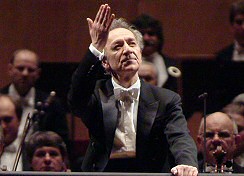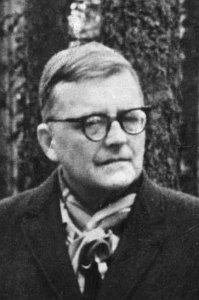Shostakovich and Temirkanov Open the BSO Season
D. Shostakovich, Symphonies Nos.5 & 6, St.PetersburgNewPhil / Temirkanov |
 After difficult contract negotiations that were just recently resolved, it was very good to welcome the Baltimore Symphony Orchestra back in time for their season opener at Strathmore last Thursday. Indeed, it was an entire evening of welcome returns: Yuri Temirkanov, now no longer the Music Director of the Baltimore Symphony, came back for this concert - and for the Mahler Kindertotenlieder that now occupied the first half of an originally all-Shostakovich program the audience welcomed Nancy Maultsby (last heard in Temirkanov’s farewell concert of Mahler’s Second) back. It was a rousing affair.
After difficult contract negotiations that were just recently resolved, it was very good to welcome the Baltimore Symphony Orchestra back in time for their season opener at Strathmore last Thursday. Indeed, it was an entire evening of welcome returns: Yuri Temirkanov, now no longer the Music Director of the Baltimore Symphony, came back for this concert - and for the Mahler Kindertotenlieder that now occupied the first half of an originally all-Shostakovich program the audience welcomed Nancy Maultsby (last heard in Temirkanov’s farewell concert of Mahler’s Second) back. It was a rousing affair.Visibly more at ease now that he does not have to be in Baltimore, the diminutive, wiry Maestro led an amiable if not very idiomatic performance of the Mahler. Nancy Maultsby (whose return seemed like her wish to show her talent in a better light better than in last season’s Mahler where illness hampered her) impressed with sonorous low notes and dedication to these songs. I wish I had liked it better, still, but the singing was too dense, too mealy to be really enjoyable. The poems by Friedrich Rückert need not be understood for the Kindertotenlieder to be enjoyed (otherwise even most native speakers would get little out of them) but with the text open, they should at least be possible to follow for the audience members. Moreso, the way of pronouncing and vocally shaping a text influences the sound and I suppose Ms. Maultsby’s tone might not have seemed to come from somewhere between above he gum and behind her upper cheekbones had she sung Barber or Duparc. Still, with those low sounds and her wide range she proceeded to get well beyond these reservations and, together with the determined orchestral contribution behind her, wooed on Mahler’s behalf for more frequent performances of the “Children Death Songs”.
If the second half of the 2005/2006 season was Mozart-mania, the first half of the 2006/2007 season will be Shostakovich-salacity. “DSCH-5” was Temirkanov’s contribution to the celebrations – and a celebration it was!
 Shostakovich’s music is one of the prime examples of how extra-musical elements determine our appreciation of music itself. There are of course hundreds of those elements that influence our enjoyment of music: from the way we slept the night before to our particular mood that moment or whether we had that espresso or glass of wine before listening… But unlike these ephemeral events that make us like one thing today but not tomorrow (vice versa rarely happens because an associated negative impression keeps us from returning to that particular work or version thereof), the “Shostakovich Factor” is one that has influenced critical and public perception at large and has lasted for many decades.
Shostakovich’s music is one of the prime examples of how extra-musical elements determine our appreciation of music itself. There are of course hundreds of those elements that influence our enjoyment of music: from the way we slept the night before to our particular mood that moment or whether we had that espresso or glass of wine before listening… But unlike these ephemeral events that make us like one thing today but not tomorrow (vice versa rarely happens because an associated negative impression keeps us from returning to that particular work or version thereof), the “Shostakovich Factor” is one that has influenced critical and public perception at large and has lasted for many decades. The idea: Shostakovich is the wily anti-totalitarian writer who was cowed into writing superficially propagandistic and conformist music that secretly sticks it to the Soviet dictators. Propagated by such figures as Solomon Volkov in his “authentic biography” of Shostakovich, “Testament”, and immediately taken up by the (Russian-émigré) champions of Dmitri Dmitrievich’s cause in the west once they realized how marketable this image was, this idea of Shostakovich has been the single most important factor for the popularity of his music in the West – and I include his music itself among those factors. Assume the opposite situation: That this moral white-washing of his music didn't exist and we thought his works mere propaganda-bombast cranked out to the greater glory of Stalin & Co., all by a good Soviet citizen, informer, and apparatchik. We would condemn it to the furthest reaches of the repertory the way we hail a 'secret freedom-fighter' in every of his third movements. In all this DSCH’s music would only be the ball in a moral-political game; not always good enough to assert itself against defamation, nor so bad as not being loveable with the correct ideology attached.
Tim Smith Compelling pairing opens BSO season (Baltimore Sun, September 30) |
Temirkanov, calm and understated on the outside (not quite in the regal, stern manner of Mravinsky but a far cry from the animated style that was Bernstein’s or the hopping and bopping that is Slatkin’s), conjured a rousing, but not over-the-top Fifth Symphony. The lower strings sounded particularly great in the opening of the second movement, the brass as good as ever under him, and the rhythms were almost delicately accentuated amid the noise-assault. The orchestra visibly played their hearts out for him and the result sounded accordingly great.
The program will be performed again at the Joseph Meyerhoff Symphony Hall tonight, Saturday, at 8PM and tomorrow, Sunday, at 3PM.




















































